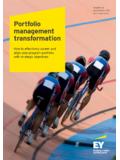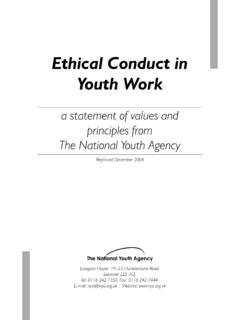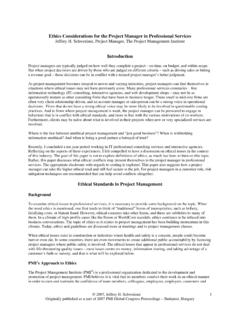Transcription of Pharmaceutical marketing: ethical and responsible conduct
1 Pharmaceutical marketing : ethical and responsible conductA survey on effectiveness of the guidelines September 2011 Pharmaceutical marketing : ethical and responsible conduct2 Pharmaceutical marketing : ethical and responsible conduct3 ForewordRecent media articles have brought to the fore the nexus between health care professionals (HCPs) and Pharmaceutical companies. HCPs are lured by promises of costly gifts and foreign trips to exotic locales in the guise of seminars and conferences in return for prescribing a company s products. This tends to impair the judgment of the HCP due to a conflict of interest between patient safety and personal gain. Several other instances of unethical behaviour on the part of HCPs and Pharmaceutical companies frequently keep making the news. Indian regulators have been attempting to effectively regulate and monitor the professional conduct of medical practitioners and Pharmaceutical companies for a long time. The Department of Pharmaceuticals (DoP) under the Ministry of Chemicals and Fertilizers, Government of India, has been recently formed to look into the activities of the Pharmaceutical industry.
2 In order to check any irregularities the DoP introduced a voluntary draft uniform code of Pharmaceutical marketing practices (UCPMP) for the Indian Pharmaceutical industry in June 2011. Some of the areas covered in the code include claims and comparisons of medicinal products, advertising and promotional material, the activities and conduct of medical representatives as well as the hospitality extended and gifts given to HCPs. Voluntary implementation of the UCPMP by Pharmaceutical associations and companies will be reviewed after six months from its initiation, and if it is discovered that it has not been effectively implemented, the Government may consider making this a statutory the other hand, the Medical Council of India amended its guidelines in 2009 to regulate the conduct of medical practitioners, to keep pace with the changing medical scenario in the country. It has introduced new regulations with regard to the relationships of HCPs with Pharmaceutical and allied health sector companies.
3 Along with these guidelines and code of marketing , India has adopted a two-tier approach that covers HCPs (doctors) and Pharmaceutical companies operating in the country, to create a transparent and ethical environment that will benefit consumers. However, diligent and effective implementation of the regulations and periodically monitoring them is imperative to ensure that the intent of the legislation is interpreted uniformly and a level playing field is maintained for all players. At Ernst & Young, we have conducted a survey among HCPs and Pharmaceutical companies to understand their perspective of the MCI s guidelines and the DoP s marketing code. We are pleased to share the findings of our study with you in this take this opportunity to express our gratitude to the people and organizations who took time to respond to our survey. The report and the findings would not have the same value without the support of these respondents and all those who made the survey hope you find this report relevant and Singh Partner and National Director Fraud Investigation & Dispute Services (FIDS) Ernst & Young Pvt.
4 marketing : ethical and responsible conduct4 ContentsExecutive summary 5 marketing of Pharmaceutical products 6 Recordkeeping of samples and hospitality provided 8 Impact on Pharmaceutical sales 10 Effectiveness of regulations 12 Need for robust internal controls 14 Annexure 16 Pharmaceutical marketing : ethical and responsible conduct5 The ethical conduct of health care professionals is vital for maintaining professional autonomy, integrity and independence in their interactions with Pharmaceutical and allied health care organizations. Implementation of good marketing practices by Pharmaceutical companies demonstrates their adoption of ethical practices and transparency in their survey is an attempt to provide an insight into how current regulations are affecting health care professionals and the Pharmaceutical survey is in two parts:1. Part one of the survey was conducted among marketing professionals in the Pharmaceutical sector on the draft uniform code of marketing practices for the Indian Pharmaceutical industry (UCPMP) issued by the DoP, Ministry of Chemicals and Fertilizers, Government of of the significant findings of the survey Around two-third of the respondents felt that the implementation of the UCPMP would change the manner in which pharma products are currently marketed in India.
5 According to the survey, more than 50% of the respondents are of the opinion that the UCPMP s guidelines may lead to manipulation in recording of actual sampling activity. More than 50% of the respondents indicated that the effectiveness of the code will be very low in the absence of legislative support provided to the UCPMP committee. An overwhelming majority of the respondents (90%) felt that pharma companies in India should focus on building a robust internal controls system for ensuring compliance with the UCPMP. Around 72% of the respondents felt that the MCI was not stringently enforcing its medical ethics guidelines. And only 36% of the respondents felt that the MCI s guidelines would have an impact on the overall sales of pharma summary2. Part two was conducted among health care professionals on the guidelines issued by the Medical Council of India (MCI) regarding its code of conduct for HCPs in their relationship with Pharmaceutical and allied health care Ernst & Young was assisted by a market research agency in conducting interviews.
6 All the interviews were conducted telephonically. In all, 100 respondents participated in the marketing : ethical and responsible conduct6 marketing of Pharmaceutical productsAccording to the survey, three out of every five respondents indicated that the UCPMP issued by the DoP would impact marketing of drugs in India. Pharmaceutical marketing : ethical and responsible conduct7 Around 72% of the respondents indicated that the code of marketing practice will impact the manner in which pharma products are marketed to consumers. India has one of the fastest-growing Pharmaceutical markets in the world, and its market size has nearly doubled in the past five years. The country s Pharmaceutical market is expected to reach US$20 billion by 2015 from US$ billion in 2009 at a CAGR of , and establish its presence among the world s leading 10 markets. At present, it is the third-largest market in the world in terms of volume and 14th in terms of clearly indicate the tremendous growth potential of India s Pharmaceutical sector and the degree of competition among players to secure a larger share of the market.
7 In this industry, direct-to-consumer marketing is not popular, since patients rely on doctors prescriptions and guidance on any medication. Therefore, Pharmaceutical companies focus more on promoting their products among HCPs. In such a scenario, this takes three main forms such companies giving gifts and free drug samples, and their sponsoring continuing medical education (CME) for doctors. The DoP released a draft uniform code on voluntary regulation of the marketing practices3 in the Indian pharma industry on 2 June 2011. The regulator intends to ensure that promotion of pharmaceuticals to health care professionals and interactions between pharma companies and the latter is carried out in a responsible , ethical , professional and legal manner. This will help to assure consumers that their choices in respect to their medication are made on the basis of the efficacy of each product for the individual health care needs of 1: Will implementation of the UCPMP change the manner in which pharma products are currently marketed in India?
8 Sample: 50 | Base: AllIn 2002, over 20,000 registered drug manufacturers sold US$9 billion worth of formulations and bulk drugs in India. However, most of the players in the market are small to medium enterprises and 250 of the largest companies control 70% of the Indian Yes72%No28%Figure 2: Will UCPMP guidelines on claims and comparisons, and textual and audio-visual promotional material result in more transparent and ethical marketing of pharma products in India?Sample: 50 | Base: AllAccording to the code, pharma companies will be required to disclose relevant information on indications for use, known side effects and contra-indications of drugs for patients, to enable them to make informed decisions on their choice of medication. Furthermore, misrepresentation of existing products as new ones by simply changing their packaging will not be possible under the provisions of the Taking wings, Ernst & Young, 2009; Indian pharma market valued at over Rs 55K crore in FY10, The Economic Times, 30 July Pharmaceuticals in India, wikipedia, , accessed 1 September marketing : ethical and responsible conduct8 Record-keeping of samples and hospitality providedDrug samples distributed by drug companies to medical practitioners form an essential part of their overall marketing strategy.
9 According to the survey, more than 50% of the respondents felt that enforcement of UCPMP may lead to manipulation in recording actual sampling marketing : ethical and responsible conduct9 More than 80% of the respondents felt that the words reasonable and appropriate in the code are open to interpretation by pharma companies. The record-keeping requirements defined in the code, relating to distribution of free samples, is expected to bring transparency on the number of units sampled, the names of medical representatives, as well as the place, quantity and date of sampling, and also identify the beneficiaries of the free samples. This will help to curb unethical practices in the guise of sampling. Furthermore, it will also help to identify whether organizations are complying with the other provisions of the 3: In light of UCPMP regulations relating to distribution of free medicinal samples, would field formations indulge in manipulation of records to conceal non-compliance with the code?
10 Sample: 50 | Base: AllIn the absence of any clear directives or quantification for extending hospitability to HCPs, it appears that the regulator may have left a gap for pharma companies to take undue advantage of the code. Figure 4: What is the possibility that lack of explicit monetary limits set in the UCPMP in respect to guidelines on reasonable hospitality, as well as on appropriate travel expenses, meals, refreshments, accommo-dation and registrations, etc., for HCPs will be open to interpreta-tion by pharma companies?Sample: 50 | Base: AllVery high32%High50%Low8%Very low10% Pharmaceutical marketing : ethical and responsible conduct10 Impact on Pharmaceutical salesNearly two-third of the medical practitioners who participated in the survey felt that the MCI s guidelines will have no impact on the sales of Pharmaceutical marketing : ethical and responsible conduct11 Figure 5: Do you think the MCI s guidelines, issued on 10 December 2009 in respect to the interactions of practicing physicians with pharmaceuti-cal companies, will have an impact on the overall sales of pharma-ceutical companies?















